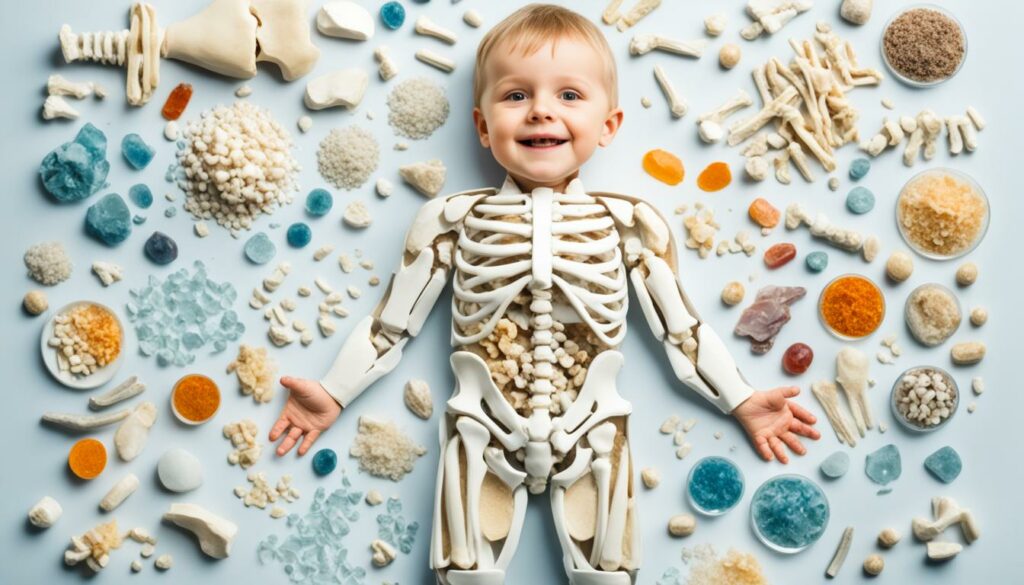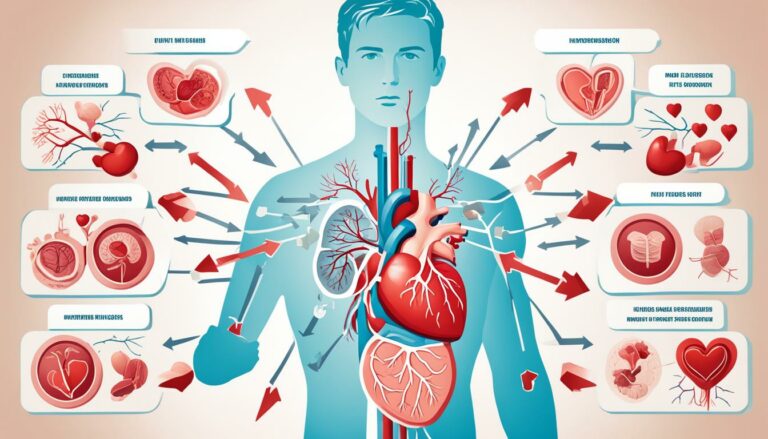Can Teens Take Magnesium? Essential Info for Parents
As parents, we want to ensure that our teenagers are getting the right nutrients to support their growth and development. One essential nutrient that often goes unnoticed is magnesium. But can teens take magnesium? The answer is a resounding yes! Magnesium is not only safe for teenagers but also plays a crucial role in their overall health and well-being.
Key Takeaways:
- Magnesium is safe and beneficial for teenagers, supporting their growth and development.
- Magnesium is involved in over 300 processes in the body and plays a role in energy production, muscle relaxation, nerve function, blood pressure regulation, and brain function.
- The recommended magnesium intake for teenagers is 280-300mg, which can be obtained from various magnesium-rich foods.
- Magnesium supplements may be necessary for teenagers with specific health conditions or inadequate dietary intake, but it’s important to consult with a healthcare practitioner first.
- Ensuring a balanced diet and incorporating magnesium-rich foods, such as leafy greens, nuts, seeds, vegetables, legumes, and whole grains, can help teenagers meet their daily magnesium needs.
The Role of Magnesium in Children’s Energy

Magnesium plays a crucial role in supporting children’s energy. It acts as a cofactor for enzymes involved in energy production, increasing their efficiency. This helps children maintain their energy levels and support their active and curious nature.
Enzymes are proteins that facilitate chemical reactions in the body. They act as catalysts, speeding up the rate of these reactions. Magnesium serves as a necessary cofactor for many enzymes involved in energy metabolism.
“Magnesium is essential for ATP production, the main source of energy in cells,” says Dr. Lisa Reynolds, pediatric nutritionist at Children’s Health Center. “ATP, or adenosine triphosphate, is like a cellular currency, providing energy for various cellular processes. Magnesium helps activate enzymes that convert food into ATP, ensuring efficient energy production.”
One of the key enzymatic processes in which magnesium is involved is the conversion of glucose into ATP through glycolysis. This process occurs in the cytoplasm of cells and is the first step in energy production. Magnesium acts as a cofactor for the enzyme hexokinase, which initiates glycolysis by phosphorylating glucose.
In addition to its direct role in ATP production, magnesium also supports energy production by enhancing mitochondrial function. Mitochondria are the powerhouses of cells, responsible for generating most of the ATP. Magnesium acts as a cofactor for enzymes involved in the Krebs cycle and oxidative phosphorylation, two key processes that occur within the mitochondria to produce ATP.
Furthermore, magnesium plays a crucial role in muscle contraction and relaxation, which is essential for physical activity and energy expenditure in children. It helps regulate the release of calcium ions from the sarcoplasmic reticulum, a network of tubules in muscle cells. This is important for muscle contraction and the subsequent release of calcium ions to allow for relaxation.
Ensuring an adequate intake of magnesium is essential for children to maintain optimal energy levels and support their active lifestyles. Including magnesium-rich foods in their diet, such as leafy greens, nuts, seeds, and whole grains, can help meet their magnesium needs.
Magnesium-Rich Foods for Children’s Energy
| Food | Magnesium Content (per 100g) |
|---|---|
| Spinach | 79mg |
| Almonds | 270mg |
| Pumpkin seeds | 534mg |
| Quinoa | 197mg |
| Brown rice | 44mg |
By understanding the role of magnesium in children’s energy production and incorporating magnesium-rich foods into their diet, parents can support their child’s overall energy levels and promote their active and curious nature.
Magnesium’s Impact on Cognitive Development in Children

Magnesium plays a crucial role in supporting children’s cognitive development. It is necessary for the production and function of neurotransmitters, which are responsible for passing signals between brain cells.
Neurotransmitters play a vital role in facilitating various cognitive functions, such as learning, memory recall, problem-solving, mood regulation, and behavior in children. Adequate levels of magnesium ensure the smooth transmission of these signals, enabling optimal cognitive development.
Research has shown that magnesium deficiency can have adverse effects on cognitive function and behavior in children. Insufficient magnesium levels may lead to difficulties in concentration, poor memory, increased anxiety, and irritability.
By ensuring an adequate intake of magnesium, parents can support their children’s cognitive development and help them reach their full potential.
The Role of Neurotransmitters in Cognitive Development
Neurotransmitters are chemical messengers that transmit signals between nerve cells in the brain. They play a critical role in cognitive function, influencing various aspects of learning, memory, mood, and behavior.
Neurotransmitters act as messengers, allowing different parts of the brain to communicate effectively. They are involved in transmitting signals related to cognitive processes such as attention, focus, memory formation, and emotional regulation.
Magnesium is involved in the production and release of neurotransmitters, ensuring their proper functioning. It acts as a cofactor for enzymes responsible for neurotransmitter synthesis, helping to regulate their levels in the brain.
Magnesium and Learning Abilities
Research suggests that magnesium supplementation may positively influence learning abilities in children. Adequate magnesium levels promote optimal brain function, enhancing memory consolidation and retrieval, as well as improving attention and concentration.
Studies have shown that magnesium supplementation in children with attention deficit hyperactivity disorder (ADHD) can lead to improvements in their learning abilities and behavior. Magnesium helps regulate the activity of neurotransmitters involved in attention and focus, reducing symptoms associated with ADHD.
Magnesium and Cognitive Development in Children
| Benefits of Magnesium for Cognitive Development | Effects of Magnesium Deficiency |
|---|---|
| Improved memory and learning abilities | Difficulties in concentration and memory recall |
| Enhanced problem-solving skills | Increased anxiety and irritability |
| Support for mood regulation | Impaired cognitive function and behavior |
The Importance of Magnesium in Physical Development of Children

Magnesium plays a crucial role in the physical development of children. It supports the growth and development of bones, muscles, and nerves, contributing to their overall physical milestones.
Bone Growth: Magnesium aids in bone growth by helping to regulate calcium absorption and bone formation. It works in synergy with other minerals like calcium and vitamin D to ensure optimal bone health and strength. Adequate magnesium levels are essential for proper bone development, especially during periods of rapid growth.
Muscle Strength: Magnesium is involved in muscle contraction and relaxation. It supports the function of muscles, allowing them to contract and exert force. Children with sufficient magnesium levels are more likely to have better muscle strength, coordination, and endurance, enabling them to participate in physical activities and sports with ease.
Nerve Development: Magnesium plays a vital role in nerve development and function. It allows nerve impulses to transmit messages to the brain effectively. Adequate magnesium levels help ensure proper nerve development, aiding in physical milestones such as walking, balance, and manual dexterity.
To better understand the role of magnesium in physical development, imagine a construction site. Magnesium acts as the scaffold, providing structural support and facilitating the construction process. Without magnesium, the building blocks of physical development would struggle to come together cohesively.
| Physical Development Benefits of Magnesium | |
|---|---|
| Supports bone growth and development | |
| Aids in muscle strength, coordination, and endurance | |
| Facilitates nerve development and transmission |
Ensuring children have sufficient magnesium intake is crucial for their optimal physical development. By incorporating magnesium-rich foods into their diets and considering supplementation when necessary, parents can support their child’s physical milestones and overall well-being.
Magnesium in Teenagers and Puberty

Puberty is a transformative phase in a teenager’s life, marked by significant hormonal changes and physiological development. Magnesium plays a crucial role in supporting these changes and promoting overall well-being during this crucial stage.
During puberty, the body experiences an increase in the production of sex hormones such as testosterone and estrogen. These hormones are essential for the development of secondary sexual characteristics, including the growth of reproductive organs, the deepening of the voice in boys, and the onset of menstruation in girls.
As teenagers undergo these hormonal changes, magnesium actively participates in hormone production, helping to regulate the levels of testosterone and estrogen. By maintaining a balance of these hormones, magnesium contributes to the normal functioning of the reproductive system and ensures healthy development during puberty.
In addition to its role in hormone production, magnesium also plays a vital role in supporting energy production and cognitive development in teenagers. This mineral is involved in numerous enzymatic processes that are responsible for energy metabolism in the body. By providing energy at the cellular level, magnesium aids in physical activities, cognitive functions, and overall mental well-being.
Cognitive development is a key aspect of a teenager’s growth during puberty. As they learn and acquire new knowledge, their brains undergo significant changes. Magnesium helps support cognitive functions such as memory, attention, and problem-solving by facilitating neurotransmitter synthesis and neural communication.
As teenagers become more involved in sports and face increased educational demands, the role of magnesium becomes even more crucial. This mineral supports energy production, allowing teenagers to be physically active and mentally alert. Furthermore, it helps in reducing fatigue and providing the necessary fuel for the body and brain to perform at their best.
Incorporating magnesium-rich foods into a teenager’s diet is essential for meeting their daily requirements. Foods such as leafy greens, nuts, seeds, legumes, and whole grains are excellent sources of magnesium that can support the growing needs of teenagers during puberty.
By providing adequate magnesium during this transformative phase, parents can support their teenager’s hormonal balance, energy production, and cognitive development. Ensuring a well-rounded diet that includes magnesium-rich foods is crucial for promoting overall health and well-being during this important stage of life.
Recommended Magnesium Dosage for Teenagers
Ensuring that teenagers get an adequate amount of magnesium is crucial for their overall health and well-being. Public Health England recommends a daily magnesium intake of 280-300mg for teenagers. This dosage is essential to support the various roles that magnesium plays in their bodies, including hormone production, energy production, and cognitive function.
Magnesium is involved in numerous processes in the body, such as regulating blood pressure, supporting muscle relaxation, and facilitating nerve function. In teenagers, magnesium is particularly important as they experience rapid physical and cognitive development.
To help visualize the recommended magnesium dosage for teenagers, refer to the table below:
| Age Group | Recommended Magnesium Intake |
|---|---|
| Teenagers | 280-300mg |
Meeting the recommended magnesium intake can be achieved through a balanced diet that includes magnesium-rich foods. However, it’s important to note that individual needs may vary depending on factors such as physical activity levels, overall health, and specific medical conditions.
Magnesium-rich foods that can be incorporated into a teenager’s diet include:
- Leafy greens such as spinach and kale
- Nuts and seeds like almonds, cashews, and pumpkin seeds
- Vegetables such as broccoli and Brussels sprouts
- Legumes like beans and lentils
- Whole grains such as quinoa and brown rice
By ensuring teenagers have a diverse and balanced diet that includes these magnesium-rich foods, parents can help support their teenagers’ magnesium intake and promote optimal health.
Dietary Sources of Magnesium for Children and Teens
Magnesium is a vital nutrient that can be obtained from a variety of dietary sources. By incorporating these magnesium-rich foods into children and teens’ diets, parents can ensure that their growing bodies receive an adequate intake of this essential mineral.
Here are some examples of magnesium-rich foods:
- Leafy greens, such as spinach, kale, and Swiss chard
- Nuts, such as almonds, cashews, and Brazil nuts
- Seeds, like pumpkin seeds, sunflower seeds, and flaxseeds
- Vegetables, including broccoli, Brussels sprouts, and green beans
- Legumes, such as chickpeas, lentils, and black beans
- Whole grains, like brown rice, quinoa, and oats
- Bananas
- Nut butters, such as almond butter and peanut butter
- Dates
Encouraging a balanced and diverse diet that includes these magnesium-rich foods can help ensure that children and teens receive the necessary amount of magnesium to support their growth and development.
| Food | Magnesium Content (per 100g) |
|---|---|
| Spinach | 79mg |
| Almonds | 270mg |
| Pumpkin Seeds | 262mg |
| Broccoli | 21mg |
| Chickpeas | 115mg |
| Brown Rice | 44mg |
| Bananas | 27mg |
| Almond Butter | 234mg |
| Dates | 43mg |
Note: The magnesium content may vary depending on the specific variety, preparation, and cooking method of each food.
By incorporating these magnesium-rich foods into meals and snacks, parents can help ensure that their children and teens meet their magnesium requirements naturally. Remember, a diverse and balanced diet is key to promoting overall health and well-being.
Symptoms of Magnesium Deficiency in Children
Magnesium deficiency, although not common, can occur in children, particularly those with poor diets or certain health conditions. It is important for parents to be aware of the signs and symptoms of magnesium deficiency to ensure their child’s optimal health and well-being.
Magnesium plays a crucial role in many bodily functions, including energy production, muscle contraction, and nerve function. When magnesium levels are low, children may experience a range of symptoms that can impact their overall health and daily functioning.
The signs of magnesium deficiency in children can vary, and it is crucial to consult a healthcare practitioner for an accurate diagnosis. Some common symptoms of magnesium deficiency in children include:
- Loss of appetite
- Nausea
- Vomiting
- Fatigue
- Weakness
- Muscle weakness and cramps
- Poor sleep
- Irritability
- Difficulty concentrating
- Mood changes
Recognizing these symptoms can help parents address potential magnesium deficiency and take the necessary steps to ensure their child receives an appropriate amount of this essential nutrient.
It is important to note that these symptoms can be attributed to various other factors, so it is essential to consult a healthcare practitioner for a proper diagnosis. They can provide guidance on the most appropriate course of action, which may include dietary changes, supplementation, or further medical evaluation.
Benefits of Magnesium Supplements for Children
If a child is not getting enough magnesium through their diet or has specific health conditions, magnesium supplements can be beneficial. These supplements can help improve sleep, mood, concentration, energy levels, bone and teeth health, blood sugar levels, bowel regulation, immune system function, and digestion. However, it is always best to consult with a healthcare practitioner before starting any new supplements.
Studies have shown that magnesium supplementation can have positive effects on children’s overall health and well-being. Here are some of the key benefits:
- Improved Sleep: Magnesium helps regulate sleep patterns and promotes deep, restful sleep. It can be particularly helpful for children who struggle with insomnia or restless sleep.
- Enhanced Mood: Adequate magnesium levels support the production of serotonin, a neurotransmitter that regulates mood. Supplementing with magnesium can help reduce irritability, anxiety, and depressive symptoms in children.
- Increased Concentration: Magnesium plays a vital role in brain function and cognitive development. By optimizing magnesium levels, children may experience improved focus, attention, and concentration.
- Boosted Energy Levels: Magnesium is involved in energy production at the cellular level. Supplementing with magnesium can provide children with the energy they need to engage in physical activities and maintain an active lifestyle.
- Healthy Bones and Teeth: Magnesium works synergistically with calcium and vitamin D to support bone health and development. It aids in the absorption and utilization of calcium, ensuring that children’s bones and teeth grow strong and healthy.
- Stabilized Blood Sugar Levels: Magnesium helps regulate insulin, the hormone responsible for maintaining blood sugar levels. By supplementing with magnesium, children with insulin resistance or type 2 diabetes may experience improved blood sugar control.
- Proper Bowel Regulation: Magnesium acts as a natural laxative, promoting regular bowel movements and preventing constipation in children.
- Enhanced Immune System Function: Magnesium plays a role in immune system health, supporting the body’s defense against infections and illnesses. Supplementing with magnesium can help strengthen a child’s immune system.
- Improved Digestion: Magnesium helps relax the muscles of the digestive tract, promoting healthy digestion and reducing symptoms such as bloating, cramping, and indigestion.
It’s important to note that while magnesium supplements can be beneficial, they should not replace a balanced diet rich in magnesium-rich foods. Supplements should be used under the guidance of a healthcare practitioner to ensure proper dosage and safety.
Remember, every child’s needs are unique, and consulting with a healthcare practitioner will help determine if magnesium supplementation is appropriate and beneficial for your child.
Magnesium Supplements for Children’s Health – A Comparison
| Brand | Type | Dosage | Form | Price |
|---|---|---|---|---|
| Nature’s Way Kids Nutrition Supergreens + Wild Raspberry Powder | Magnesium with additional nutrients | 500mg (per serving) | Powder | $19.99 |
| SmartyPants Kids Mineral Complete Daily Gummy Multivitamin | Multivitamin with magnesium and other minerals | 50mg (per serving) | Gummy | $19.95 |
| Garden of Life Vitamin Code Kids Chewable Whole Food Multivitamin | Multivitamin with magnesium and other nutrients | 100mg (per serving) | Chewable | $24.99 |
Table: A comparison of different magnesium supplements for children.
Before choosing a magnesium supplement, consider factors such as the child’s age, dietary preferences, and any specific health concerns. It is also advisable to read product labels and consult with a healthcare practitioner to ensure the supplement is safe and appropriate for your child.
Remember, while magnesium supplements can be beneficial, it is essential to prioritize a balanced diet with magnesium-rich foods as the primary source of this essential nutrient.
How to Incorporate Magnesium into Children’s Diets
Incorporating magnesium-rich foods into children’s diets can sometimes be a challenge, but with a little creativity, it can be done. By offering snacks and incorporating magnesium-rich ingredients into recipes, parents can ensure their children are getting an adequate intake of this essential nutrient.
For younger children, snacks like bananas, nut butters, and dates are a great way to introduce magnesium-rich foods. These options are not only delicious but also convenient for on-the-go snacking.
For older kids and teenagers, recipes that include magnesium-rich ingredients can be both appealing and nutritious. Consider incorporating avocados into sandwiches or salads, using a variety of seeds and nuts for added crunch and flavor, and exploring the versatility of magnesium-rich vegetables like spinach and kale.
| Magnesium-Rich Snacks for Kids | Magnesium-Rich Recipes for Teens |
|---|---|
|
|
Variety and balance are key when it comes to incorporating magnesium into your child’s diet. By offering a wide range of magnesium-rich foods and exploring different recipes and snack options, you can ensure your child is getting the necessary nutrients to support their overall health and well-being.
The Benefits of Incorporating Magnesium into Children’s Diets:
“By incorporating magnesium-rich foods into your child’s diet, you can help support their energy levels, cognitive development, and physical growth.”
Remember, the recommended daily intake of magnesium for children varies depending on age. It is always a good idea to consult with a healthcare professional or a registered dietitian for personalized advice and recommendations.
Additional Tips:
- Include a variety of magnesium-rich foods in your child’s meals and snacks.
- Experiment with different recipes to make magnesium-rich foods fun and enticing.
- Encourage your child to participate in meal planning and preparation to develop a positive relationship with food.
- Consider magnesium supplements if recommended by a healthcare professional.
Conclusion
In conclusion, magnesium plays a vital role in the physical and cognitive development of children and teenagers. It is necessary for energy production, muscle relaxation, nerve function, and brain health. By ensuring that children and teens receive an adequate intake of magnesium through their diet, parents can support their overall well-being and help them reach their full potential.
It is recommended that teenagers consume 280-300mg of magnesium daily, which can be obtained from magnesium-rich foods such as leafy greens, nuts, seeds, vegetables, legumes, and whole grains. However, in cases where magnesium intake is insufficient, supplementation may be necessary under the guidance of a healthcare practitioner.
By understanding the importance of magnesium and taking proactive steps to incorporate it into their children’s diets, parents can help promote healthy physical development, cognitive function, and overall growth. Remember, a balanced and diverse diet is key to ensuring a sufficient intake of this essential nutrient.
FAQ
Can teens take magnesium?
Yes, magnesium is safe and beneficial for teenagers. It plays a crucial role in their energy production, cognitive development, and physical growth.
What are the benefits of magnesium for teens?
Magnesium supports energy production, muscle relaxation, nerve function, blood pressure regulation, and brain function in teenagers. It also aids in hormone production, cognitive development, and physical milestones.
What is the recommended magnesium dosage for adolescents?
The recommended magnesium intake for teenagers is 280-300mg per day, as advised by Public Health England.
Are there magnesium supplements for teenagers?
Yes, magnesium supplements can be beneficial for teenagers who may not be getting enough magnesium through their diet or have specific health conditions. However, it is important to consult with a healthcare practitioner before starting any new supplements.
What are the symptoms of magnesium deficiency in teenagers?
Symptoms of magnesium deficiency in teenagers can include loss of appetite, nausea, vomiting, fatigue, weakness, muscle weakness and cramps, poor sleep, irritability, difficulty concentrating, and mood changes.
How can teenagers get enough magnesium from their diet?
Teenagers can obtain magnesium from various food sources such as leafy greens, nuts, seeds, vegetables, legumes, whole grains, bananas, nut butters, and dates. Encouraging a balanced and diverse diet is key to ensuring an adequate intake of magnesium.
Is magnesium deficiency common in teenagers?
Magnesium deficiency is not common in teenagers but can occur in those with poor diets or certain health conditions.
What are the benefits of magnesium supplements for teenagers?
Magnesium supplements can help improve sleep, concentration, energy levels, bone and teeth health, blood sugar levels, bowel regulation, immune system function, and digestion in teenagers.
How can parents incorporate magnesium-rich foods into their children’s diets?
Parents can offer snacks like bananas, nut butters, and dates for younger children. For older kids and teens, recipes with magnesium-rich ingredients like avocados, smoothies, and sweet potato and cacao brownies can be appealing.
Why is magnesium important for children’s energy?
Magnesium acts as a cofactor for enzymes involved in energy production, increasing their efficiency and helping children maintain their energy levels throughout the day.







